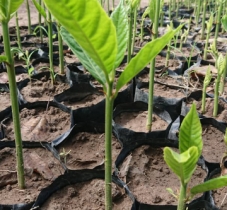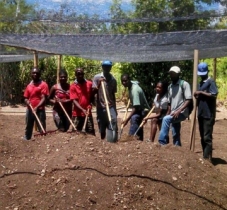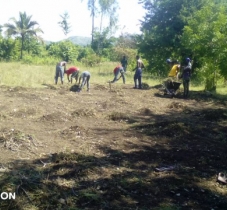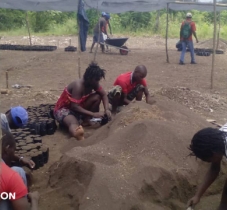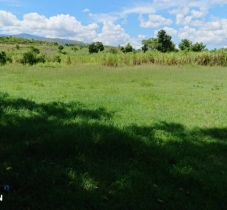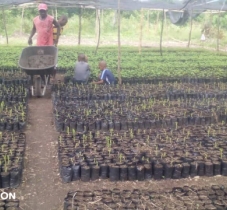Project description
Develop agroforestry, restore degraded ecosystems, and protect biodiversity in one of the most deforested countries: Haiti.
The project at a glance
- Number of trees to be planted in 2020-2021: 500,000
- Trees planted: Mango, Avocado, Cachiman, Soursop, Bitter orange, Sweet orange, Cashew, Moringa, Cacao, Palmiste, Fig tree, Breadfruit tree, Mapou, Oak, Mahogany, Saman, Cedar, Papaya
- Percentage of women involved: 40%
- Planting date: November 2020 to April 2022
Presentation of the organization responsible for the project
Agrinotech was born from the desire to change traditional farming methods and to fight global warming and desertification on the island of Haiti.
In 2018, the NGO was founded and began to implement ambitious projects around poultry farming, food crops and reforestation. To build this project, Agrinotech mobilizes communities, religious groups, women's associations, and schools. The objective is clear: to raise awareness and involve as many people as possible to make them understand the importance of changing their practices towards more environmentally and forest friendly methods.
Background information
Long known as the pearl of the West Indies, Haiti has suffered severe deforestation over the past century. In 1920, 60% of Haitian territory was covered with forests, compared to only 2% today. Unfortunately, this makes Haiti one of the most deforested countries in the world today.
The massive loss of forest cover is mainly due to the production of charcoal, which is the main source of energy for the population. On the ground, the ongoing deforestation has serious consequences. It leads to soil erosion, reduced productivity of agricultural land, increased droughts and ultimately desertification, which in turn increases pressure on the remaining standing trees. As a result, deforestation accentuates the impoverishment of farmers and throws them onto the roads of rural exodus.
Project activities
The project will cover 8 rural communal sections and their surroundings. Agrinotech will ensure that the majority of the municipality's citizens actively participate in the project's activities to ensure its sustainability. Fruit tree seeds will be collected for the preparation of seedlings in nurseries. Forest and fruit tree seeds will be purchased in specialized stores. Citrus cuttings (sour orange, orange, orange, orange, lemon) will be prepared from mature plants to grow vegetatively propagated plants (cuttings). The nursery will be established in a location that meets the requirements of this activity and will be set up during the dry period and transplanting during the rainy period, to ensure the best conditions for the young plants. To monitor the project, one or two people per section will be recruited. A technician will be hired under a renewable monthly contract to monitor the fieldwork under the supervision of an agronomist and an agronomist for the overall supervision of the project. The number of seedlings prepared, the success rate will be recorded to inform us about the quality of the plantations. Finally, since public participation is necessary for the success of this project, these activities will be carried out with the participation of the active population; children, youth and adults will be included in all activities.
Project period
From August 2019 onwards, the material and social preparation of the project will be initiated (mobilization of stakeholders, recruitment, purchase of equipment, etc.). From September 2019 to May 2020 the construction of the nurseries, necessary for the production of the plants, and their production will take place. From May 2020 and depending on the weather conditions and the growth stage of the plants, their distribution and planting will be carried out.
Rich in its diversity, the Saint-Michel-de-l'Attalaye project continues to grow. After planting 250,000 trees in 2020, we continue to support Agrinotech in the planting of 500,000 trees to pursue reforestation in northern Haiti.


